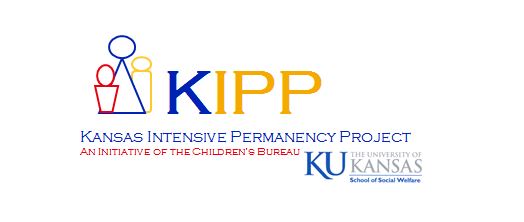Kansas Intensive Permanency Project (KIPP) helps families and children

The Kansas Intensive Permanency Project (KIPP) is a statewide partnership between the University of Kansas, the Kansas Department for Children and Family Services, and Kansas’ two private providers of foster care- KVC Behavioral Healthcare and St. Francis Community Services. KIPP is funded by the Children’s Bureau, Administration on Children, Youth and Families, Administration for Children and Families, U.S. Department of Health and Human Services, under grant number 90-CT-0152.
KIPP’s goals include:
1. Help families of children with serious emotional disturbance (SED) reintegrate earlier and more stably.
2. Increase families’ capacity to provide for their children’s needs.
3. Work with the family and community on addressing barriers to reintegration.
4. Connect families to long term community based services and supports.
5. Provide intensive and necessary services to support families with children in foster care.
KIPP uses Parent Management Training-Oregon (PMTO), selected in 2010, as the evidence-based intervention to help parents manage the behavior of their children. PMTO is designed to promote pro-social skills and cooperation and prevent, reduce, and reverse the development of conduct problems. Effective parenting skills are the core components of the PMTO model, including: Skill Encouragement, Limit Setting, Problem Solving, Monitoring, and Positive Involvement.
PMTO believes that parents are their children’s best teachers and as such seeks to partner with parents to increase positive parenting practices. PMTO aims to increase positive parenting practices through skill building in five key areas of encouragement, limit setting, problem solving, monitoring/supervision, and positive involvement.
In October of 2011 KIPP staff (supervisors, therapists, data liaison’s) were hired and began training in the PMTO model. KIPP therapists began working with families in December of 2011. Across the state approximately 646 families have received PMTO intervention through KIPP. Families who have completed treatment have experienced a great deal of success in healing and improving relationships.
May is National Foster Care Month. The Children’s Bureau has highlighted the success one family experienced in KIPP in this blog post. To learn more information about KIPP visit their website.
By Kelly Young, LMSW